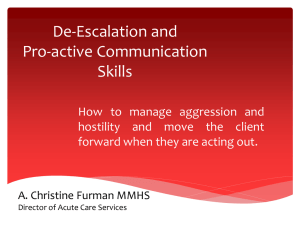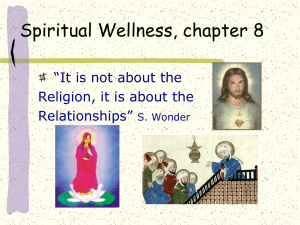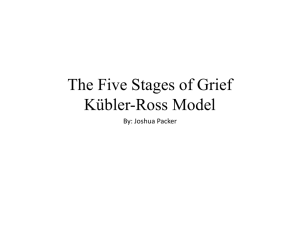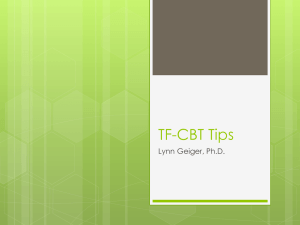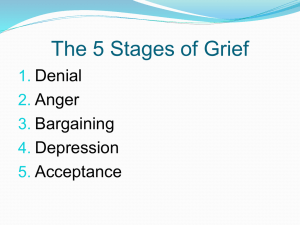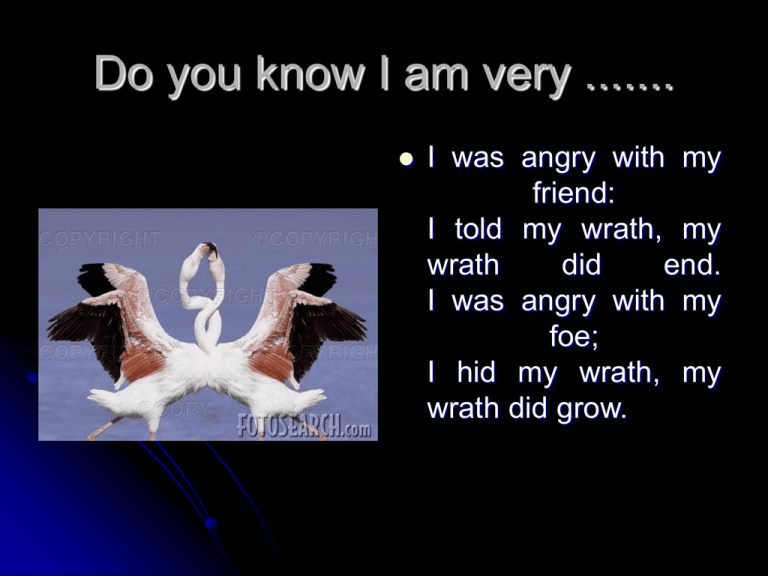
Do you know I am very .......
I was angry with my
friend:
I told my wrath, my
wrath
did
end.
I was angry with my
foe;
I hid my wrath, my
wrath did grow.
Expressing Anger
By : Dinh Thi Le
Ninh Thi Phuong Lan
Definition
Anger is feeling mad
in response to
frustration or injury.
Anger is an
emotionalphysiologicalcognitive internal
state; it is separate
from the behavior it
might prompt.
The Nature of Anger
Anger is "an emotional
state that varies in
intensity
from
mild
irritation to intense fury
and rage," according to
Charles
Spielberger,
PhD, a psychologist
who specializes in the
study of anger.
Anger can be caused
by both external and
internal events.
angry at a specific
person or event (a traffic
jam, a canceled flight),
worrying or brooding
about
your
personal
problems.
Memories of traumatic or
enraging events can also
trigger angry feelings.
Anger may do more
harm than any other
emotion. First of all it
is very common and,
secondly, it upsets at
least two people--the
aggressor and the
aggressed against.
Situations angering people
Breaking a promise
Lying
Interfering in
personal matters
Breaking confidence
Taking smt without
permission
Situations angering people
Being insulting
(intentionally)
Failing to apologies
when there's been an
obvious wrong)
Failing to thanks smb
Failing to speaking
passing
Failing to return
invitations
Expressing anger
Language realization of anger
Lexical choice
Adjectives
Verbs
Structural choice
Swear words
Addres forms The imperative structure The inter ogative structure The nominal form
1.
Adjectives: often are negative in meanings
A. Adjectives expressing S’s feeling of anger
In English:
angry
displeased
furious
annoyed
unhappy
fed up
Ex: - I’m very displeased
that you did not do what
you were asked to do.
- I am getting angry now.
In Vietnamese:
bùc
c¸u
giËn
tøc
®iªn tiÕt
s«i tiÕt (s«i m¸u lªn)
Ex: - T«i rÊt c¸u v× cËu
kh«ng lµm ®óng nh÷ng
g× ®îc yªu cÇu.
- Tao ®ang bùc m×h ®©y.
B. Adjectives expressing H’s negative qualities
In English:
crazy
stupid
foolish
mad
creepy
idiot
blackguardly
base
Ex: - How stupid you are!
- You, foolish!
In Vietnamese:
®iªn
ngu ngèc/ ngu si
®Çn
lo¹n ãc
®Óu (gi¶)
h háng/ h ®èn/ mÊt nÕt
khèn n¹n
mÊt d¹y/ v« häc
Ex: - §å khèn n¹n.
- Sao mµy ngu thÕ h¶!
C. Adjectives expressing H’s negative qualities
In English:
crazy
stupid
mad
creepy
Ex: “You, stupid!”
“What a mad guy!”
In Vietnamese:
®iªn
mÊt nÕt
®Óu (gi¶)
ngu si
mÊt d¹y
Ex: “Th»ng ®Óu c¸ng.”
“§å mÊt nÕt nhµ mµy. §å mÊt
d¹y!”
It is not relevant if we use “uneducated” in English as the
equivalence of “mÊt d¹y/ v« häc” in Vietnamese because “mÊt
d¹y/ v« häc” has a cultural meaning which emphasizes on
people’s behaviors.
2. Verbs: are often strong, morphologically short,
phonologically simple
In English:
clear
shut (up)
fuck
piss
go/get (away)
Ex: - Fuck you!
- Shut up!
In Vietnamese:
xÐo
c©m/ngËm (måm)
chÕt
cót
biÕn
Ex: -Cót ngay cho tao.
- Mµy c©m måm ®i.
3. Swear words: often called bad language/ dirty
language or obscene language. Many of them refer to
sex or bodily functions.
In English:
fucking hell
damn
shit
motherfucker
fuck off
piss (off)
Ex: Damn it!
Fuck it!
In Vietnamese:
§. mÑ (nã)
MÑ cha (mµy)
M¶ cha/ mÑ (mµy)
Chã chÕt
Tæ/Tiªn s (cha)
Ex: - C¸i ®å chã chÕt nhµ
mµy!
- Tæ cha mµy!
3. Addressing forms: there is a significant difference
between English and Vietnamese due to the number of
word-choice
In English:
often pronoun + vocatives
--> can carry the emotional
feeling.
Ex: - You old bastard!
- You fucks don’t know
shit about us.
In Vietnamese:
a various set of pronouns that
carry
emotional
expressions.
- pronouns: g·, h¾n, mµy,
con, y, nã…
- pronouns + vocatives: th»ng
kia, bµ kia, «ng kia…
Ex: - Mµy cã Implicature
ngay cho tao nhê ®îc
kh«ng!
- Síng cha ‘con’!
B. Structural choice
1. The imperative structure: this can be an imperative
with or without an overt subject.
In English:
- Get out of here!
- Piss off!
- You, shut up!
overt S
Without
an overt S
With an
2. The interrogative structure:
In English: the use of WHquestion is common.
Ex: - What the hell have you
been doing?
- Where the fuck have
you been?
In Vietnamese:
C©m
miÖng
l¹i!
Without
- Im måm ngay! an overt
S
- Mµy cót ngay cho tao.
(With an overt S)
In Vietnamese: various types
are used (wh-question; tagquestion; yes/noquestion…)
Ex: - Mµy lµm c¸i g× mµ cø
Çm Çm lªn thÕ!
- §i ®©u mµ giê míi dÉn x¸c
3. The nominal form: a single word or a longer, more
complicated noun-phrase.
In English:
bitch, bullshit, the fucking
car, shit, son of a bitch, old
bastard…
Ex: It’s one long, goddamn,
hot, miserable, shit-ass,
fucking day. (from: From
Dusk till Dawn)
In Vietnamese:
®å con chã/lîn/bß/gißI;
qu©n mÊt d¹y/khèn n¹n; ®å
®Óu, ®å v« häc, th»ng
chã…
Ex: - Th»ng ngu nh bß kia.
- Qu©n khèn n¹n, ®å ®Óu
c¸ng nhµ mµy.
4. Others:
* Statements:
- I’m annoyed that you did not do your duty. (T«i rÊt bùc anh kh«ng lµm
nhiÖm vô cña m×nh).
* Conditional sentences:
- If you don’t shut up, you’ll go to hell. (C©m ngay kh«ng th× tao cho chÕt
b©y giê)
* Exclamations:
Direct verbal or cognitive signs:
Open hatred and insults: "I hate your guts;" "I'm really mad;" "You're
so damn stupid."
Contempt and disgust: "You're a selfish SOB;" "You are a spineless
wimp, you'll never amount to anything."
Critical:
"If
you
really
cared
about
me,
you'd...;"
"You can't trust _______."
Suspicious: "You haven't been fair;" "You cheated!"
Blaming: "They have been trying to cause me trouble."
I don't get the respect I deserve: "They just don't respect the owner
(or boss or teacher or doctor) any more."
Revengeful: "I wish I could really hurt him."
Name calling: "Guys are jerks;" "Women are bitches;" "Politicians are
self-serving liars."
Less intense but clear: "Well, I'm a little annoyed;" "I'm fed up with...;"
"I've had it!" "You're a pain." "I don't want to be around you."
Thinly veiled verbal signs:
"No, I'm not mad, I'm just
disappointed, annoyed, disgusted,
put out, or irritated."
"You don't know what you are
talking about;" "Don't make me
laugh."
"Don't push me, I'll do it when I get
good and ready."
"Well, they aren't my kind of
people."
"Would you buy a used car from
him?"
"You could improve on..."
"Unlike Social Work, my major
admits only the best students."
Indirect verbal signs:
1. "I just don't want to talk."
2.
"I'm disappointed in our
relationship."
3. "I feel bad all the time."
4.
"If you had just lost some
weight."
5.
"I'm really swamped with
work, can't we do something
about it?"
6.
"Why does this always
happen to me?"
7.
"No, I'm not angry about
anything--I just cry all the
time."
Expressing anger
Directness vs indirectness
Age
Gender
Occupation Residence
Positive vs negative politeness
Age
Gender
Occupation Residence
Address forms and address relationship types
Age
Gender
Occupation Residence
Strategies to express anger
2) Hypocrisy
You are angry, but hide it beneath a smile
and present a false persona, pretending to
be someone you’re not. This behavior
evolves into bad faith of all kinds. Although
you think you are fooling others, in truth you
are losing yourself and your own selfrespect.
Strategies to express anger
3) Depression
Depression is anger and rage turned
against oneself. It comes from not
being able to identify or appropriately
express the anger one is feeling. It
then simply turns into depressions,
attack against the person who is
experiencing it.
Strategies to express anger
4) Passive Aggression –
Anger expressed not by what we do but by
what we do not do. We refuse to give the
other person what they ask for, want or
need. In this manner we anger the other
while making it seem as though they are the
one that is overly demanding. This is a way
of expressing anger without taking
responsibility for it, and blaming the other for
what we have set in motion.
Strategies to express anger
Direct vs. Indirect
*Age: the older
the less direct
*Gender: male more direct
*Occupation: manual labors more
direct
*Residence: rural residents more
direct
Strategies to express anger
Positive vs. Negative Politeness
*Age: the older the more positive
*Gender: female more positive
*Occupation: intellectuals more positive
*Residence: urban residents more
positive
ADDRESSING forms
Examples:
"That person is a real pain in the butt!"
"Thinking about that makes my skin crawl"
"As soon as I walk into the exam room my
stomach starts to churn"
"Looking at her makes my heart stand still."
"What a pain in the neck!"
"I'm so mad I feel like I'm going to explode!"
Implications
Socio – Cultural Differences and Cultural Shock in
Cross – Cultural Communication
Craig’s Model of Cultural
Shock
•
•
•
•
Physical Differences: water, food, clothes…
Sensory Differences: Sights, smells, taste…
Cultural Differences: Customs, beliefs,
manners…
Reactions to Cultural
Shock
Flight and Fight: Encapsulating in one’s own
culture bubble with minimum contact with the new
culture
Cultural Empathy: Adjust to both one’s own
culture and the new one with the equal contact
Going native: Adjust to the new culture with
minimum contact with one’s own culture
Ting – Toomey’s attributes
Attributes
Tolerance for ambiguity
Open – mindedness
way
Flexibility
Respectfulness
Adaptability
situations
Sensitivity
nonverbally
Creativity
thinking
Abilities
Abilities to meet new situations with mindfulness
Abilities to respond culture others in none valuable
Abilities to shift frame of reference
Abilities to show positive regard for another person
Abilities to adapt appropriately to particular
Abilities to convey empathy verbally and
Abilities to engage in divergent and systems – level





